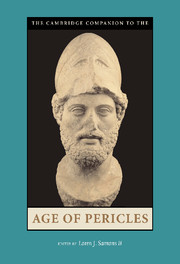Book contents
- Frontmatter
- Introduction: Athenian History and Society in the Age of Pericles
- 1 Democracy and Empire
- 2 Athenian Religion in the Age of Pericles
- 3 The Athenian Economy
- 4 Warfare in Athenian Society
- 5 Art and Architecture
- 6 Other Sorts: Slaves, Foreigners, and Women in Periclean Athens
- 7 Drama and Democracy
- 8 The Bureaucracy of Democracy and Empire
- 9 Plato’s Sophists, Intellectual History after 450, and Sokrates
- 10 Democratic Theory and Practice
- 11 Athens and Sparta and the Coming of the Peloponnesian War
- Conclusion: Pericles and Athens
- Bibliography
- Index
4 - Warfare in Athenian Society
Published online by Cambridge University Press: 28 March 2009
- Frontmatter
- Introduction: Athenian History and Society in the Age of Pericles
- 1 Democracy and Empire
- 2 Athenian Religion in the Age of Pericles
- 3 The Athenian Economy
- 4 Warfare in Athenian Society
- 5 Art and Architecture
- 6 Other Sorts: Slaves, Foreigners, and Women in Periclean Athens
- 7 Drama and Democracy
- 8 The Bureaucracy of Democracy and Empire
- 9 Plato’s Sophists, Intellectual History after 450, and Sokrates
- 10 Democratic Theory and Practice
- 11 Athens and Sparta and the Coming of the Peloponnesian War
- Conclusion: Pericles and Athens
- Bibliography
- Index
Summary
In 432, Sparta and its allies, fearing the growth of Athens's power and its aggressive policies, decided to go to war. In subsequent negotiations, the Spartans raised specific demands that, if accepted, might have avoided war. Urged by Pericles, the Athenians decided not to negotiate about ultimatums; any disagreements were to be resolved by arbitration, as envisaged by the Thirty Years' Peace of 446. A few months later, fighting began. After almost three decades of war, interrupted by a short period of ineffective peace, Sparta prevailed. In 404, starved and exhausted, the Athenians capitulated.
Pericles died in 429. Only the outbreak and first two years of this war were his responsibility. Thucydides explains its catastrophic outcome by the mistakes and rivalries of Pericles' successors. In his view, Pericles' plan, strategy, and calculations were sound; had the Athenians followed his advice, they could have won (2.65.8-10). He supports this judgment by a comprehensive assessment that he lets Pericles formulate in a speech before the war (1.140-44): Financial reserves and a centralized, unified process of deliberation and decision-making are crucial for success in war. Both are typical of Athens but not of the enemy. In a single land battle, the Peloponnesians can take on the rest of Greece, but they do not have the resources to fight the type of war that is required to defeat the Athenians. They are farmers, not sailors, used to engaging in short infantry wars with neighbors but unable to spend much time away from home and lacking experience in fighting long wars overseas.
- Type
- Chapter
- Information
- The Cambridge Companion to the Age of Pericles , pp. 96 - 124Publisher: Cambridge University PressPrint publication year: 2007
- 4
- Cited by

